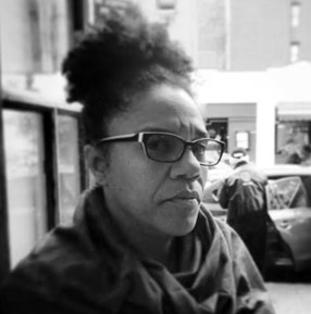[To read an introduction to this column, please see the first paragraph of the initial post here]
This week I would like to feature a poem I found recently that I think is powerful and important to read. It is from the accomplished poet R. Erica Doyle, and her words about the poem are given at the end.
Where is She ::: Koté Li Yé
Long ago I met
a beautiful boy
Together we slept
in my mother’s womb
Now the street of our fathers
rises to eat him
::
Everything black
is forbidden in Eden
In my arms my brother
sleeps, teeth pearls
I give away the night
so he can have this slumber
::
I give away the man
who made me white
I give away the man
who freed my mother
I pry apart my skull
my scalp unfurls
::
I nestle him gray
inside my brain,
my brother sleeps
and dreams of genes
mauve lips fast against spine
he breathes. The sky
::
bends into my eyes
as they search for his skin
Helicopter blades
invade our peace:::
Where is that Black
Where is it
Where
::
Blades slice, whine
pound the cupolas
I slide him down and out
the small of my vertebrae
He scurries down the bone
and to the ocean
::
navigates home
in a boat carved of gommier
When he reaches our island
everyone is relieved
though they have not
forgotten me, belsé
::
Where is
your sister, eh?
Whey?
Koté belsé yé?
Whey?
Koté li yé
Koté li yé
To the sand
To the stars on the sea
Koté li yé
Koté li yé
To the one-celled egun
To the torpid moon
Koté li yé
Koté li yé
::
There:::
Koté li yé
drapes across a baton;
glows electric in shine of taser;
pumped dry with glass bottle;
::
There:::
Koté li yé
vagina gape into the night;
neck dangle taut with plastic
bags and poorly knotted ropes;
::
There:::
Koté li yé
belsé
Koté?
::: I burn
my skin shines blacker, lacquer
::: non-mwen sé flambó
ashes tremble in the moonlight
::: sans humanité
my smoking bones fume the future
::: pa bwè afwéchi pou lafiyèv dòt moun
“I shared my mother’s womb with a brother and feel infinitely protective of him; the killings of black men at the hands of the state feels personal, as does working against the causes of this violence, and this poem acknowledges the labor of black women to uplift and protect their communities. Like many other black women in the United States, I, too, have been subjected to racial profiling by law enforcement and am deeply affected by the stories of sexual abuse and murder of women—particularly black, trans, and indigenous women—by those in power. I wrote this poem in solidarity with the #SAYHERNAME movement, which seeks to elevate and address the abuse of and violence against women by authorities. The poem asks, both in English and in Trinidadian French Patois—my grandmother’s native language —‘where is your sister?’ which reminds us to always ask about women and girls. It ends with a Patois proverb that translates roughly to ‘you cannot cure your own illness with the medicine of another’—reminding us that to address injustice, we must use a fine-grained, intersectional approach.”
—r. erica doyle



Leave a Reply
Be the First to Comment!